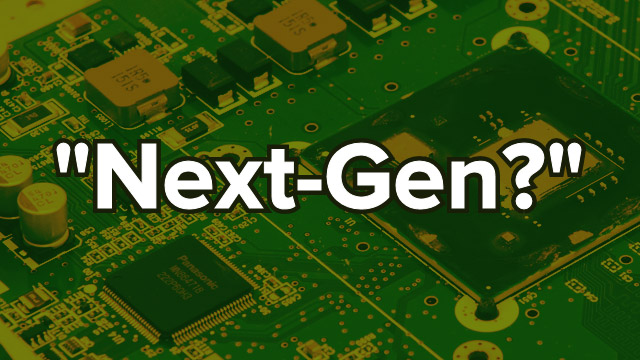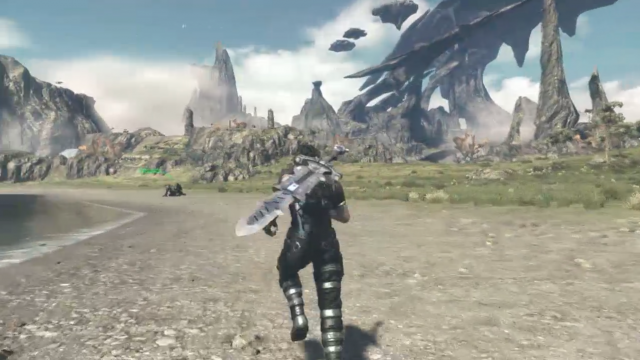
At this year’s Game Developers Conference, Mark Rein, vice president and co-founder of Epic Games (developers of the Gears of War series for Xbox 360), was asked if the studio’s Unreal Engine 4 would be compatible with Wii U. Rein initially laughed at the question, before responding,
“We’re not… we have Unreal Engine 3 for the Wii U. Right? And Unreal Engine 3 is powering all kinds of amazing games, still lots of games are being made with Unreal Engine 3…But our goal for Unreal Engine 4 console-wise is next-gen consoles. That’s really what our energies are focused on.”
As you’d expect, fans were immediately outraged at his perceived snobbishness, taking issue with the way he condescendingly dismissed Wii U not only as a “current-gen” platform, alongside PlayStation 3 and Xbox 360 (both of which are in the final year of their lifecycles), but that the mere thought of running the engine on the console was laughable. Rein quickly backtracked on this statement (though not before digging himself deeper into the hole he had created), confirming that Unreal Engine 4 can be scaled to work on a variety of different platforms, from smartphones and low-end PCs to, yes, Wii U, and apologizing for the inelegant way he phrased his response.
Fans were certainly justified in taking offense at Rein’s initial comment, but that’s neither here nor there. Whether or not Rein supports Wii U is his prerogative, and it’s silly to think that he– and, by extension, his studio– would suddenly come around to the console because of its unique controller. The issue as I see it, however, is with the term “next-gen,” which has been conflated to mean cutting-edge. It’s true the term has always carried with it connotations of improved memory and greater processing power– things that make the machines already on the market look obsolete in comparison. But that Rein himself later admitted the engine can, in fact, be scaled for current platforms highlights just how meaningless the term has become. How can an engine be truly “next-gen” if it is compatible with “current-gen” technology? Wouldn’t that, by his own definition, render it a current-gen engine?

Monolith’s Wii U project “X” looks pretty good for a current-gen game…
The other facet of this incident is Rein’s casual dismissal of Wii U as a current-gen platform, which seems to reflect the industry’s obsession with hardware power, and further highlights how meaningless the term “next-gen” has become. When it first entered gaming parlance, “next-gen” quite literally meant a hardware maker’s next console. Since then, it has been used to hype any product– be it a game, a system, or an engine, as was the case in Rein’s incident– that is technically superior to current offerings, but that meaning does not hold up when applied to console generations. The fact of the matter is that Wii U will be sharing shelf space with PlayStation 4 and the next Xbox, which does indeed make it a “next-gen” console, at least until the current game systems are phased out of stores, at which point all three of them will become “current-gen” platforms.
It’s also close-minded to think that hardware power is the only barometer in determining whether or not a console is truly “next-gen.” No one will argue that Wii U will be far less powerful than either of its competitors, but like Wii before it, it introduces its own innovations, more subtle than the promised revolution of motion controls, but no less important to the medium, to compensate for this disadvantage. Like its predecessor, Wii U attempts to redefine the relationship between video games and your television. Unlike Wii, however, which allowed you to interact with the TV screen via the Wii Remote, the Wii U GamePad decouples the gaming experience from the television, allowing you to use the console entirely through its controller. On its own, this may not seem like a particularly noteworthy feature, but its real advantage stems from the added convenience this setup brings, which is especially evident when you want to quickly install a new hardware update or download a new title from the eShop. Being able to jump right into one of the platform’s services or play a game without occupying the TV changes the dynamic between televisions and home consoles, which I’d argue is as “next-gen” as improved visuals.
Unfortunately, it may be too late to extricate “next-gen” from our collective vocabulary. The term has become so ingrained in the gaming vernacular that it’s impossible to discuss any upcoming platforms without it, and Rein’s comments, while not intended as derisive, only reinforce the perception that hardware power is the sole criteria in judging a console’s worth. It may well be that Wii U’s inadequacies in this regard will cripple its chances of garnering third party support (which the staff have already debated at length in a recent round table), but that’s a different discussion entirely, and it’s far too early in the generation to say with any sort of certainty. Regardless, the term “next-gen” has become a hollow buzzword that’s long since lost its meaning, and I’d be happy to see it relegated to history with all of the past-gen consoles it once described.




 ShareThis
ShareThis







I think you’re reading into this too much. Epic are, above all, a technical company. They make games, but their business is clearly making engines. It shouldn’t be surprising that one of the heads of the company is inclined to categorize game consoles based on power.
I think what he meant was that a lot of the new and powerful stuff in UE4 isn’t going to work on the Wii U, since it’s more comparable to current-gen systems than next-gen systems. In that sense, the PS4 and X720 are their “goals”, since that’s where the value (to licensees) of the engine will be apparent.
I agree that the term itself is tired, and I agree with the sentiment that a lot of “current-gen” games look pretty damned good even if they’re technically outdated. Good art direction is almost always more important than technical specs.
You hit the nail on the head, Kevin!
As a term, it used to have meaning. But that meaning has been perverted to the point of uselessness. It’s time to throw it out!
The only way the term could be salvaged is if the entire gaming industry and culture were able to take a step back and realize that “gen” is short for “generation” and that generations of things (people, for instance) are, in fact, quite cut and dry:
http://en.wikipedia.org/wiki/Console_generation#Eighth_generation_consoles_.282011.E2.80.93present.29
But, the odds of this industry/culture taking a step back is… well… they still use “hardcore” to mean any number of asinine things, now don’t they? =\
Thank you both for reading!
I didn’t want to single out Epic Games in the piece because, like Grant said, the studio makes a lot of its money licensing out its engines to other developers, so it’s only natural the company would be concerned with hardware power. But I saw Mark Rein’s comments being reported on a lot of other websites a few weeks ago, and rather than post them here as news, I thought they would be a good jumping off point for a larger discussion on the term “next-gen” and how it’s essentially become meaningless through its overuse.
Great read!
I definitely agree. I think it’s becoming more and more important to remember that gaming isn’t coming out in waves like it used to. Sure, the big three still seem in direct competition, but for the most part systems and new tech just hit the market whenever they’re ready.
Terms like next-gen are becoming obsolete, despite the fact that companies still like to throw them around to draw attention.
Thank you! I’m glad you liked it. :)